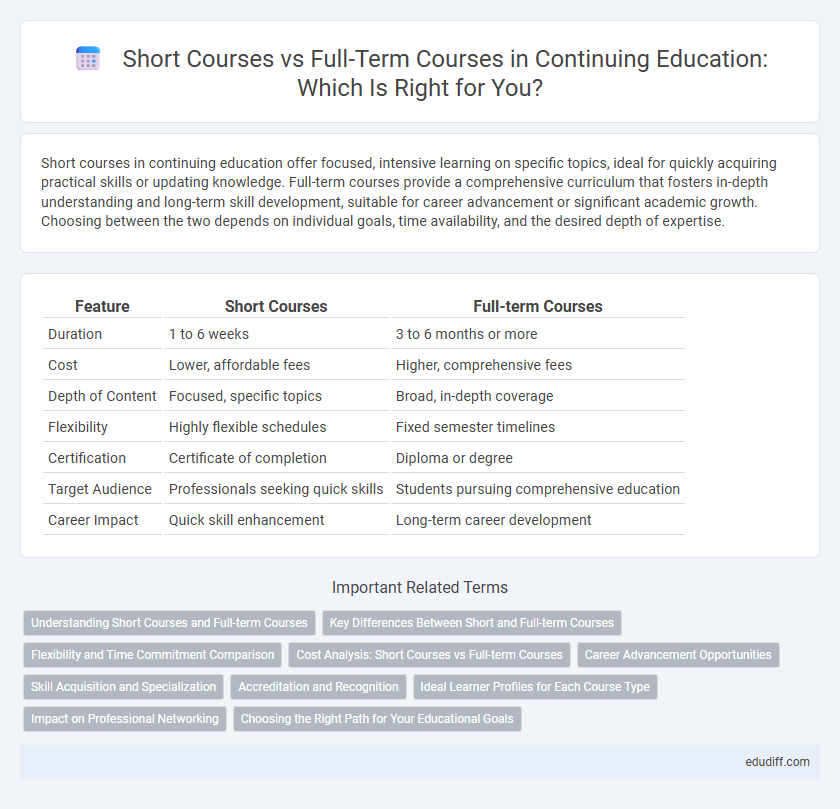Short courses in continuing education offer focused, intensive learning on specific topics, ideal for quickly acquiring practical skills or updating knowledge. Full-term courses provide a comprehensive curriculum that fosters in-depth understanding and long-term skill development, suitable for career advancement or significant academic growth. Choosing between the two depends on individual goals, time availability, and the desired depth of expertise.
Table of Comparison
| Feature | Short Courses | Full-term Courses |
|---|---|---|
| Duration | 1 to 6 weeks | 3 to 6 months or more |
| Cost | Lower, affordable fees | Higher, comprehensive fees |
| Depth of Content | Focused, specific topics | Broad, in-depth coverage |
| Flexibility | Highly flexible schedules | Fixed semester timelines |
| Certification | Certificate of completion | Diploma or degree |
| Target Audience | Professionals seeking quick skills | Students pursuing comprehensive education |
| Career Impact | Quick skill enhancement | Long-term career development |
Understanding Short Courses and Full-term Courses
Short courses offer focused, intensive learning experiences designed to impart specific skills or knowledge within a limited timeframe, typically ranging from a few days to several weeks. Full-term courses provide comprehensive education over an extended period, often aligned with academic semesters, covering broader subject matter and fostering in-depth understanding. Choosing between short courses and full-term courses depends on learners' goals, time availability, and the depth of expertise required.
Key Differences Between Short and Full-term Courses
Short courses typically last a few days to a few weeks, offering focused content designed for quick skill acquisition or specific knowledge areas, whereas full-term courses span an entire academic term or semester, providing comprehensive coverage of a subject. Short courses emphasize practical application and flexibility, often appealing to working professionals or those seeking targeted learning without a long-term commitment. Full-term courses involve extensive assessments, deeper theoretical understanding, and often contribute to formal qualifications or degrees.
Flexibility and Time Commitment Comparison
Short courses offer greater flexibility by allowing learners to engage in targeted topics within a condensed timeframe, typically ranging from a few days to weeks, making them ideal for busy professionals or those seeking specific skill upgrades. Full-term courses demand a significant time commitment, often spanning several months to an academic year, which suits students aiming for comprehensive knowledge and formal certification. Choosing between the two depends on individual scheduling constraints and the depth of learning required.
Cost Analysis: Short Courses vs Full-term Courses
Short courses typically offer a lower upfront cost compared to full-term courses, making them more accessible for learners seeking budget-friendly options. While full-term courses involve higher tuition fees, they often provide a more comprehensive curriculum and potential for financial aid or installment plans. Evaluating the cost-effectiveness requires considering long-term value, career goals, and potential return on investment from each course type.
Career Advancement Opportunities
Short courses provide targeted skills that enhance specific job functions rapidly, making them ideal for professionals seeking immediate career advancement or specialization. Full-term courses offer comprehensive knowledge and deeper expertise, which are essential for long-term career growth and higher-level positions. Employers often value full-term qualifications for leadership roles, while short courses are preferred for skill updates and role transitions.
Skill Acquisition and Specialization
Short courses offer targeted skill acquisition, enabling learners to quickly gain expertise in specific areas such as digital marketing, coding, or graphic design. Full-term courses provide comprehensive specialization, developing deep knowledge and proficiency across a broader subject like computer science or business administration. Choosing between them depends on goals: immediate skill enhancement versus in-depth mastery for career advancement.
Accreditation and Recognition
Accreditation and recognition are critical factors distinguishing short courses from full-term courses, with full-term programs typically accredited by regional or national education authorities, ensuring broader acceptance and transferability of credits. Short courses may lack formal accreditation but often offer specialized certifications recognized by industry bodies, enhancing practical skills rather than academic progression. Employers and institutions generally prioritize full-term course credentials for academic and professional advancement, while short courses serve as targeted upskilling options with variable recognition.
Ideal Learner Profiles for Each Course Type
Short courses suit learners seeking rapid skill acquisition or professional development within limited timeframes, ideal for working professionals and career changers. Full-term courses benefit students who prefer in-depth study, comprehensive understanding, and academic credentials, typically recent high school graduates and full-time learners. Each course type aligns with distinct goals, learning paces, and commitment levels to optimize educational outcomes.
Impact on Professional Networking
Short courses provide concentrated learning experiences that facilitate quick connections with industry peers, often attracting professionals eager to expand their networks efficiently. Full-term courses foster deeper relationships through prolonged collaboration, allowing for more meaningful professional bonds and access to extensive alumni networks. Both formats impact networking differently, with short courses favoring immediate engagement and full-term courses supporting sustained professional growth.
Choosing the Right Path for Your Educational Goals
Short courses offer targeted skill development and flexible scheduling, ideal for professionals seeking quick upskilling or career shifts. Full-term courses provide comprehensive knowledge and in-depth understanding, suitable for students aiming for academic credentials or extensive expertise. Assess your career objectives, time commitment, and desired depth of learning to choose the path that aligns best with your educational goals.
Short Courses vs Full-term Courses Infographic

 edudiff.com
edudiff.com